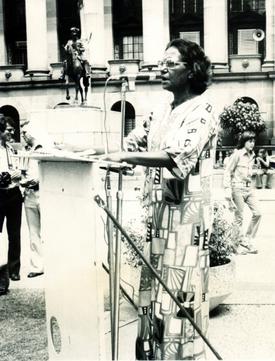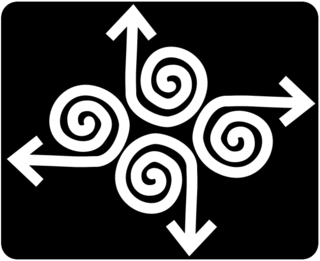
MaryAnn Bin-Sallik AO (born 1940) is a Djaru Elder and Australian academic, specialising in Indigenous studies and culture. She was the first Indigenous Australian to gain a doctorate from Harvard University. [1]

MaryAnn Bin-Sallik AO (born 1940) is a Djaru Elder and Australian academic, specialising in Indigenous studies and culture. She was the first Indigenous Australian to gain a doctorate from Harvard University. [1]
Bin-Sallik was born in Broome, Western Australia, on 2 November 1940. [2] She moved with her family to Darwin, Northern Territory, at age nine. On leaving school she trained as a nursing sister at Darwin Hospital, where she was the first Indigenous person to graduate in 1961. [1] [2] She then spent 17 years nursing in Aboriginal settlements in the Northern Territory. [3]
In 1975 Bin-Sallik was appointed student councillor to the Aboriginal Task Force (ATF) Program at South Australian Institute of Technology, Adelaide South Australia; becoming the first Indigenous Australian to work in the higher education sector. In 1979 she also completed an associate diploma of social work whilst working as student councillor. She then became coordinator of the ATF from 1980 to 1985. In 1985 she left to study at Harvard University, where she completed both a master's degree in education administration (1986) [2] and a doctorate in teaching and learning (1989). [1] [4]
Returning to Australia, she became senior lecturer in Aboriginal studies at South Australian College of Advanced Education from 1989 to 1990. Bin-Sallik was then made head of the school, Aboriginal studies and teacher education at the University of South Australia in 1990. Eight years later she became its dean of the College of Indigenous Education and Research.
Bin-Sallik delivered the 8th Frank Archibald Memorial Lecture on “Aborigines and Universities : Are They Compatible?” at the University of New England in 1993. [5]
In 2001 she returned to live in the Northern Territory and was appointed Ranger Chair and dean of faculty of the Faculty of Aboriginal and Torres Strait Islander Studies at Charles Darwin University. [6] She retired in 2008 and was awarded the title emeritus professor "for services to Indigenous Higher Education in Australia". [4]
In retirement, Bin-Sallik became chair of the Vice Chancellor's Indigenous Advisory Council at Charles Darwin University from 2013 to 2015. She was appointed pro vice-chancellor, Aboriginal and Torres Strait Islander Leadership at the University of Western Sydney in 2015 and has been a member of its board of trustees since 2016. [4]
In March 2016 Bin-Sallik was appointed a non-executive director of Aboriginal Hostels Limited, a not-for-profit organisation which provides temporary accommodation to Aboriginal and Torres Strait Islander people who are away from home. [7] She has also served as co-commissioner of the Australian Human Rights Commission's Enquiry into the Forced Removal of Aboriginal and Torres Strait Islander Children. [4]

Oodgeroo Noonuccal ( UUD-gə-roo NOO-nə-kəl; born Kathleen Jean Mary Ruska, later Kath Walker was an Aboriginal Australian political activist, artist and educator, who campaigned for Aboriginal rights. Noonuccal was best known for her poetry, and was the first Aboriginal Australian to publish a book of verse.

Lowitja O'Donoghue, also known as Lois O'Donoghue and Lois Smart, was an Australian public administrator and Indigenous rights advocate. She was the inaugural chairperson of the Aboriginal and Torres Strait Islander Commission (ATSIC) from 1990 to 1996. She is known for her work in improving the health and welfare of Indigenous Australians, and also for the part she played in the drafting of the Native Title Act 1993, which established native title in Australia.
NAIDOC Week is an Australian observance lasting from the first Sunday in July until the following Sunday. The acronym NAIDOC stands for National Aborigines and Islanders Day Observance Committee. NAIDOC Week has its roots in the 1938 Day of Mourning, becoming a week-long event in 1975.

Marcia Lynne Langton is an Aboriginal Australian writer and academic. As of 2022 she is the Redmond Barry Distinguished Professor at the Melbourne School of Population and Global Health, University of Melbourne. Langton is known for her activism in the Indigenous rights arena.
Indigenous Australians are people with familial heritage from, and/or recognised membership of, the various ethnic groups living within the territory of present day Australia prior to British colonisation. They consist of two distinct groups, which includes many ethnic groups: the Aboriginal Australians of the mainland and many islands, including Tasmania, and the Torres Strait Islanders of the seas between Queensland and Papua New Guinea, located in Melanesia.

Henrietta Marrie is a Gimuy Walubara Yidinji elder, an Australian Research Council Fellow and Honorary Professor with the University of Queensland.
Linda Yunkata Syddick Napaltjarri is a Pintupi- and Pitjantjatjara- speaking Indigenous artist from Australia's Western Desert region. Her father was killed when she was young; her mother later married Shorty Lungkarta Tjungarrayi, an artist whose work was a significant influence on Syddick's painting.
Bidjara, also spelt Bidyara or Pitjara, is an Australian Aboriginal language. In 1980, it was spoken by 20 elders in Queensland between the towns of Tambo and Augathella, or the Warrego and Langlo Rivers. There are many dialects of the language, including Gayiri and Gunggari. Some of them are being revitalised and are being taught in local schools in the region. The various dialects are not all confirmed or agreed by linguists.
Indigenous Australians are both convicted of crimes and imprisoned at a disproportionately higher rate in Australia, as well as being over-represented as victims of crime. As of September 2019, Aboriginal and Torres Strait Islander prisoners represented 28% of the total adult prisoner population, while accounting for 2% of the general adult population. Various explanations have been given for this over-representation, both historical and more recent. Federal and state governments and Indigenous groups have responded with various analyses, programs and measures.

Lewis William Arthur O'Brien, known as Yarlupurka, usually known as Uncle Lewis O'Brien, is an Aboriginal Australian elder of the Kaurna people.

Thomas Edwin Calma,, is an Aboriginal Australian human rights and social justice campaigner, and 2023 senior Australian of the Year. He was the sixth chancellor of the University of Canberra (2014-2023), after two years as deputy chancellor. Calma was the second Aboriginal or Torres Strait Islander person to hold the position of chancellor of any Australian university.
The NAIDOC Awards are annual Australian awards conferred on Australian Aboriginal and Torres Strait Islander individuals during the national celebration of the history, culture and achievements of Australian Aboriginal and Torres Strait Islander peoples known as NAIDOC Week.

The Federal Council for the Advancement of Aborigines and Torres Strait Islanders (FCAATSI), founded in Adelaide, South Australia, as the Federal Council for Aboriginal Advancement (FCAA) on 16 February 1958, was a civil rights organisation which campaigned for the welfare of Aboriginal Australians and Torres Strait Islanders, and the first national body representing Aboriginal interests. It was influential in lobbying in favour of the 1967 Referendum on Aboriginal Australians. It was renamed to National Aboriginal and Islander Liberation Movement (NAILM) in the early to mid 1970s, before disbanding in 1978.
Kathleen Mary Mills, also known as Mooradoop and Aunty Kathy, was an Australian community leader, singer, Aboriginal elder and activist in the Northern Territory of Australia. She had a large family, all musical, with several of her daughters being well known as the Mills Sisters.
Patricia Audrey Anderson is an Australian human rights advocate and health administrator. An Alyawarre woman from the Northern Territory, she is well known internationally as a social justice advocate, advocating for improved health, educational, and protection outcomes for Indigenous Australian children.
Jaquelyne Hughes FRACP is a Torres Strait Islander woman and senior research fellow at Menzies School of Health Research, Charles Darwin University. She also works as a nephrologist at the Royal Darwin Hospital.
Aboriginal Australian identity, sometimes known as Aboriginality, is the perception of oneself as Aboriginal Australian, or the recognition by others of that identity. Aboriginal Australians are one of two Indigenous Australian groups of peoples, the other being Torres Strait Islanders. There has also been discussion about the use of "Indigenous" vs "Aboriginal", or more specific group names, such as Murri or Noongar (demonyms), Kaurna or Yolngu, based on language, or a clan name. Usually preference of the person(s) in question is used, if known.
Elsie Heiss, also known as Aunty Elsie, is an Indigenous Australian, a Wiradjuri elder and a Catholic religious leader. She has led Aboriginal Catholic Ministry programs for over three decades and was NAIDOC Female Elder of the Year in 2009.
Aunty Jean Phillips is an Indigenous Australian elder and has been a senior Aboriginal Christian leader for over 60 years. She was born on the Aboriginal mission of Cherbourg, Queensland and later she served as an Aboriginal missionary herself with the Aborigines Inland Mission (AIM).